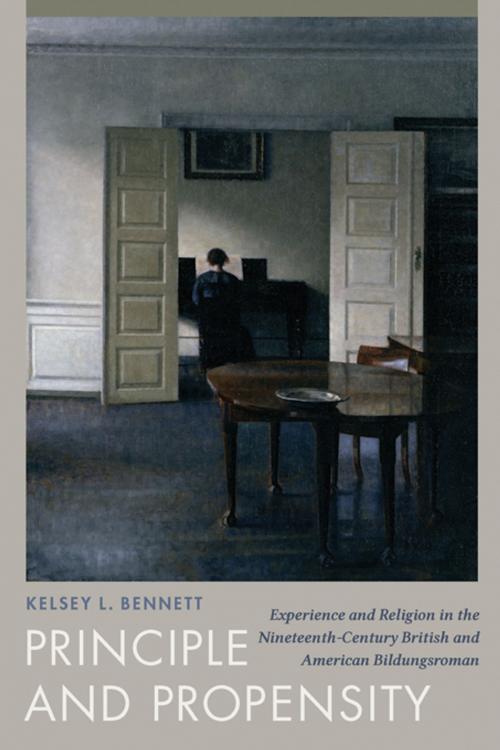Principle and Propensity
Experience and Religion in the Nineteenth-Century British and American Bildungsroman
Fiction & Literature, Literary Theory & Criticism| Author: | Kelsey L. Bennett | ISBN: | 9781611173659 |
| Publisher: | University of South Carolina Press | Publication: | September 1, 2014 |
| Imprint: | University of South Carolina Press | Language: | English |
| Author: | Kelsey L. Bennett |
| ISBN: | 9781611173659 |
| Publisher: | University of South Carolina Press |
| Publication: | September 1, 2014 |
| Imprint: | University of South Carolina Press |
| Language: | English |
Scholars have for many years now relied upon the largely unexamined assumption that the nineteenth-century Bildungsroman in the Goethean tradition is somehow an intrinsically secular genre exclusive to Europe, incompatible with the literature of a democratically based culture. Combining intellectual history with genre criticism, Principle and Propensity provides a critical reassessment of the bildungsroman, beginning with its largely overlooked theological premises: Bildung as formation of the self in the image of God. Kelsey L. Bennett examines the dynamic differences, tensions, and possibilities that arise as interest in spiritual growth, or self-formation, collides with the democratic/quasi-democratic culture in the nineteenth-century English and American bildungsroman. Bennett reexamines two long-held beliefs about the nineteenth-century bildungsroman: that it is based primarily on secular individual growth and that it is a genre exclusive to Europe. Beginning with the idea that interest in an individual’s moral and psychological growth, or bildung, originated as a religious exercise in the context of Protestant theological traditions, she shows how these traditions found ways into the bildungsroman, the literary genre most closely concerned with the relationship between individual experience and self-formation. Part one of her study examines the attributes of parallel national traditions of spiritual self-formation as they convened under the auspices of the international revival movements: the Evangelical Revival, the Great Awakening, and the renewal of Pietism in Germany led respectively by John Wesley, Jonathan Edwards, and Count Nikolaus Ludwig Zinzendorf. Part two explores the ways these traditions manifest themselves in the nineteenth-century bildungsroman in England and America through Jane Eyre, David Copperfield, Pierre, and Portrait of a Lady. Though Wilhelm Meisters Lehrjahre [Wilhelm Meister’s Apprenticeship], Johann Wolfgang von Goethe’s prototype of the genre, was a library staple for most serious writers in nineteenth-century England and in America, Bennett shows that later writers such as Charlotte Brontë, Charles Dickens, Herman Melville, and Henry James also drew on their own religious traditions of self-formation, adding richness and distinction to the received genre.
Scholars have for many years now relied upon the largely unexamined assumption that the nineteenth-century Bildungsroman in the Goethean tradition is somehow an intrinsically secular genre exclusive to Europe, incompatible with the literature of a democratically based culture. Combining intellectual history with genre criticism, Principle and Propensity provides a critical reassessment of the bildungsroman, beginning with its largely overlooked theological premises: Bildung as formation of the self in the image of God. Kelsey L. Bennett examines the dynamic differences, tensions, and possibilities that arise as interest in spiritual growth, or self-formation, collides with the democratic/quasi-democratic culture in the nineteenth-century English and American bildungsroman. Bennett reexamines two long-held beliefs about the nineteenth-century bildungsroman: that it is based primarily on secular individual growth and that it is a genre exclusive to Europe. Beginning with the idea that interest in an individual’s moral and psychological growth, or bildung, originated as a religious exercise in the context of Protestant theological traditions, she shows how these traditions found ways into the bildungsroman, the literary genre most closely concerned with the relationship between individual experience and self-formation. Part one of her study examines the attributes of parallel national traditions of spiritual self-formation as they convened under the auspices of the international revival movements: the Evangelical Revival, the Great Awakening, and the renewal of Pietism in Germany led respectively by John Wesley, Jonathan Edwards, and Count Nikolaus Ludwig Zinzendorf. Part two explores the ways these traditions manifest themselves in the nineteenth-century bildungsroman in England and America through Jane Eyre, David Copperfield, Pierre, and Portrait of a Lady. Though Wilhelm Meisters Lehrjahre [Wilhelm Meister’s Apprenticeship], Johann Wolfgang von Goethe’s prototype of the genre, was a library staple for most serious writers in nineteenth-century England and in America, Bennett shows that later writers such as Charlotte Brontë, Charles Dickens, Herman Melville, and Henry James also drew on their own religious traditions of self-formation, adding richness and distinction to the received genre.















